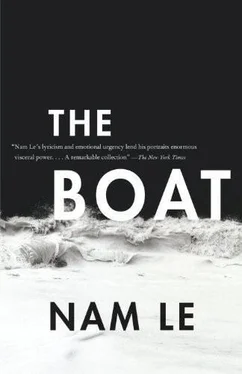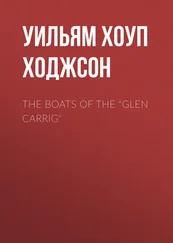Inside the hold, the stench was incredible, almost eye-watering. The smell of urine and human waste, sweat and vomit. The black space full of people, bodies upon bodies, eyes and eyes and eyes and if she'd thought the first boat was crowded, here she could hardly breathe, let alone move. Later she counted at least two hundred people, squashed into a space meant for fifteen. No place to sit, nor even put a foot down; she found a crossbeam near the hatchway and hooked her arm over it. Luckily it was next to a scupper where the air came through.
Quyen settled on the step below her, whispering to a young boy. She caught Mai's eye and smiled firmly.
The boat continued its creeping pace. People padded the engines with their clothes to reduce the noise.
"Quiet," an angry voice shushed downward. "We're near the gate."
But no one had been speaking. Through the scupper Mai peered into the night: their boat was gliding into a busy port. Pressed hard beneath her was the body of the boy Quyen had been talking to.
"Natural gate a hundred meters long," she heard suddenly. The water carried the low sound clearly. Then she realized the voice came from above deck, so subdued the person might have been talking to himself. "About ten meters wide. On the rising tide."
Then another voice under the wind, "Viet Cong. . manned with two M30S — " "Automatic, no?"
"Machine guns."
"What did Phuoc say about the permit?"
In the darkness, thought Mai, to feel against you the urgent flutter of a child's heart. The hopped-up fragility of it.
A tense sigh, "Even with the permit."
"Leave at night and they shoot. They shoot anything."
The speakers paused for a short while. Then a voice said, "We'll find out soon enough."
She settled forward against the young boy, not wanting to hear any more. Trying to block it all out: the voices, the smell. It was unnerving to think of all those other bodies in the darkness. Black shapes in the blackness, merging like shadows on the surface of oil. She crouched there, in the silence, beneath the hatchway. Spying on the bay through the scupper. Gradually, inevitably, the dark thoughts came. Here, in the dead of night, contorted inside the black underbelly of a junk — she was being drawn out into an endless waste. What did she know about the sea? She was the daughter of a fisherman and yet it terrified her. She watched as Quyen reached back and with a surprisingly practiced gesture pressed her palm against the boy's forehead. From above, watching the set of his grim face, Mai thought of her father. Their last meeting. His blindness. He'd taught her not to blame the war but how could she not? — all the power of his own sight seemed still intent on it.
Through the crack of the scupper the land lights, like mere tricks of her eyes, were extinguished one by one. Someone cut the engines.
She pulled the young boy's body closer to her; it squirmed like a restless animal's.
"Truong," a voice whispered sharply from beneath them.
She peered down. It was Quyen.
"Don't be a nuisance, Child." Quyen looked up at Mai, then said ruefully, "This is my little brat. Truong."
"Yours?" Mai frowned. "But — "
From the deepest part of the hold, several voices shushed them. In the silence that followed, even the tidal backwash seemed loud against the hull. Then a grind of something against the boat. Mai had never heard a sound so sudden and hideous.
"What is it?" "A mine? I heard they put mines — "
The metal shrieked each minute movement of the boat.
"Heavens!"
"But boats pass here, must pass here every day — "
Fiercely: "Quiet!"
The sound sheared off — leaving behind a deep, capacious silence. Mai stiffening at every creak of the boat, every dash of water against its rotten sidewood. Then, without warning, the call and fade of a faraway voice. She crushed her cheek against the crown of the young boy's head and for the first time felt him respond — both of his small fists clamping her forearm. She shut her eyes and trained herself to his frenzied heartbeat, as though its pulse — its fine-knitting rhythm — carried the only possible thread of their escape. Long minutes passed. The boat glided on, pointed headfirst into the swell. Finally the fierce voice coughed:
"We're safe for now."
Murmurs rose up. The hatch was lifted. Under the sudden starlight Mai could see the whole of the boy's face, arching up to meet the fresh air.
"Child," said Quyen, "greet Chi. Properly."
He looked up at Mai — his eyes black and clear and unblinking. " Chao Chi," he said in his reed-thin voice.
All around them people's faces were untensing, bodies and voices stirring in restless relief. But Mai, clutching this strange young boy, found herself shivering in the warm night, relief only a sharp and unexpected condensation in her eyes.
***
ONCE THE STORM PASSED, six days out, everything changed.
Fishermen on the boat agreed that this storm had come on faster than any they'd ever experienced. It destroyed the caulking and much of the planking on the hull. The inboard was flooded, and soon afterward, both engines cut out completely.
What food had been left was spoiled. Water was short. Anh Phuoc, whose authority was never questioned, took charge of rationing the remaining supply, doling it out first to children, then the infirm, then everyone else. It amounted to a couple of wet mouthfuls a day.
The heat was unbearable. Before long the first body was cast overboard. Already a handful of people had been lost during the storm, but this was the first casualty witnessed by the entire boat. To the terrible drawn-out note of a woman's keening the bundle was tossed, a meek splash, into the water.
Like everyone else, Mai looked away.
After the storm it seemed to Mai that a film had been stripped from the world. Everything became more intense — the sun hotter, the light more vivid, the sea darker, every word a discordant affront to the new silence. The storm had forced people into their privacies: the presence of others now assailed each person's solitude in facing up to the experience of it. Children turned introverted, playing as though conducting conversations with themselves.
Even time took on a false depth: the six days before the storm stretched out, merged with memory, until it seemed as though everything that had ever happened had happened on the boat.
A man burned his clothes to let up smoke. He was quickly set upon, the fire smothered — the longer they drifted the more fearful they became of pirates. That night another bundle was thrown overboard. Minutes later they heard a thrashing in the water. It was too dark to see anything, yet, still, everyone averted their gaze.
Thirst set in. Some people trapped their own urine. Some, desperate for drinkable water, even allowed themselves the quick amnesia and prayed for another storm. It was fantastic to be surrounded by so much water and yet be dehydrated. Mai soon realized she wouldn't make it. The day following the storm she imitated some of the other youth, hauling up a bucket tied to the bowline. Under the noon sun the seawater was the color of amethyst.
She drank it. It was all right at first. It was bliss. Then her throat started scalding and she wanted to claw it out.
"You stupid girl," Quyen reproached her, demonstrating how to use her fingers to induce vomiting. She hugged her fiercely. "Heavens, you can't wait? We're almost there."
But what did Quyen know? Mai had heard — how could she possibly have not? — that other boats had successfully made the crossing in two days. She tried to sleep, to slide beneath the raw scour of pain in her throat. They'd been out seven days. How much longer? Her father was persistent in her thoughts now — all those weeks, even months, he'd spent on this same sea, in trawlers much like this one. He'd been here before her.
Читать дальше











